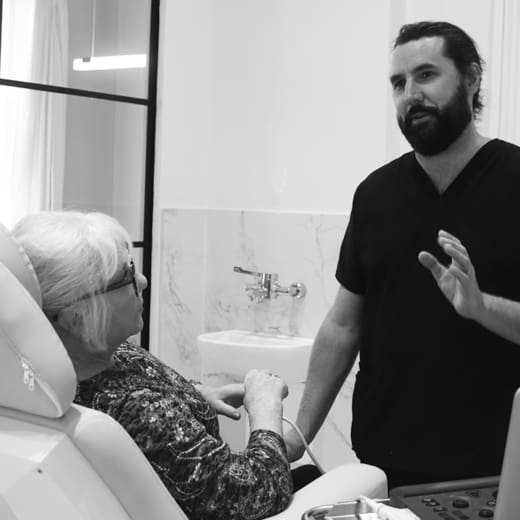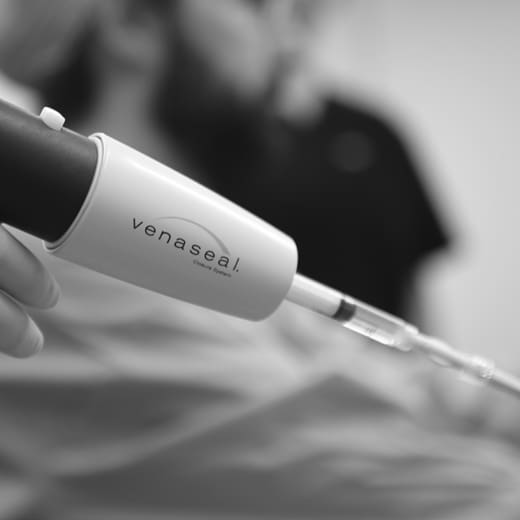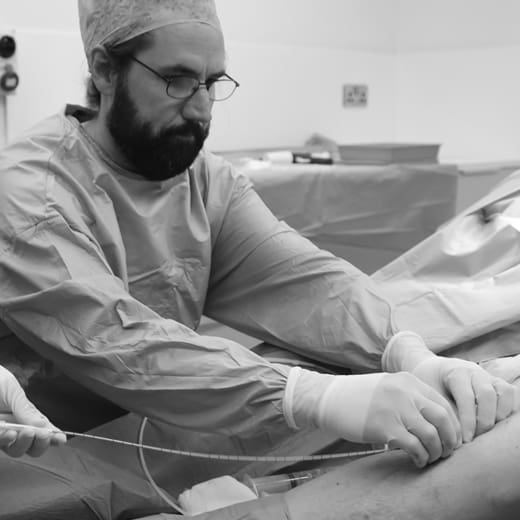McKeown Medical
167 Bath Street, Glasgow, G2 4SQ
Dr Alex Vesey is our expert consultant vascular surgeon who heads up our varicose vein team at McKeown Medical. Here, he discusses the difference between varicose veins and thread veins.
Date posted — 19.08.24
Varicose veins and thread veins, or spider veins, differ in appearance, size, and symptoms.
Varicose veins are large, swollen, and twisted veins that bulge above the skin’s surface, often appearing blue or dark purple. They usually develop in the legs and can cause discomfort, pain, and a heavy feeling.
Thread veins are much smaller, thin, and web-like, appearing just beneath the skin. They are red, blue, or purple and typically painless.
While varicose veins can lead to more serious health issues, thread veins are primarily a cosmetic concern. Both conditions result from poor circulation, but varicose veins are generally more severe.
We offer a range of treatment options for varicose veins including VenaSeal™ – the most up to date method of treating varicose veins that causes less pain and allows you to get back to normal almost immediately, without the hassle of wearing bandages or compression stockings.
Get in touch with our friendly team and we’ll help you find the right varicose vein treatment for you.

Varicose veins are enlarged, twisted veins that often appear just under the skin, primarily in the legs and feet.

When it comes to treating varicose veins, VenaSeal™ has emerged as a revolutionary option that offers a minimally invasive and...

If you're struggling with the discomfort, swelling, or unsightly appearance of varicose veins, Radiofrequency Ablation (RFA) could be the solution...
1 / 3
2 / 3
3 / 3

Varicose veins are enlarged, twisted veins that often appear just under the skin, primarily in the legs and feet.

When it comes to treating varicose veins, VenaSeal™ has emerged as a revolutionary option that offers a minimally invasive and...

If you're struggling with the discomfort, swelling, or unsightly appearance of varicose veins, Radiofrequency Ablation (RFA) could be the solution...
As everyone knows, the lack of protections in Scotland for patients having cosmetic procedures is something I have campaigned on for years.
It’s an issue that I feel very passionately about and will not stop campaigning on until we have meaningful change from our government. I have written to the government many times over the years and during the recent consultation I wrote to the minister for public health, Jenni Minto, on behalf of 20 of the most experienced doctors in aesthetic practice from all across Scotland explaining why - in very clear scientific terms - she has got it wrong with her current proposals to allow beauty therapists to continue injecting medicines and administering medical devices.
We have asked Jenni Minto to meet with us, to hear our perspective, but she continues to refuse to sit down and talk to us. In tonight’s STV news Donna has been exceptionally brave to speak on camera about the harm she has suffered as a result of a beautician, and the NHS care she has required, but sadly she is not alone.
There are so many Donnas who have been harmed in Scotland and we hear about it every day in our clinics across the country although the majority are too scared or embarrassed to speak out publicly and the government don’t want to listen to the professionals.
Whilst people like Donna continue to be harmed by the diabolical lack of regulation in Scotland, I will not stop campaigning. The government needs to act now to make injectable toxins and dermal fillers medic-only, bringing us in line with every other country in Europe, every state in America and every state in Australia.
Why don’t our government believe people in Scotland deserve the same protections as all of these other countries?

We have another exciting new launch in the clinic - and this one is for the men, or husbands, brothers AND sons!
We are bringing back hair transplant to the practice, performed by Dr Manish Mittal. Dr Mani is based in London - where he has a reputation for outstanding hairline restoration - and will be bringing his expertise to Glasgow every month in our clinic.
These are some examples of Dr Mani’s work. As you can see, he is not only great at creating natural looking hairlines - but also achieving full looking density, which is a rare skill in hair transplant and one of the key reasons we selected him to be our hair transplant partner.
If you (or someone you know!) would like to come in for a consultation and meet Dr Mani, send us a message, email us at [email protected] or call the clinic on 0141 370 0509.

In case you missed it, here’s Dr Rhona & Dr Iain’s live Q&A on all things perimenopause, menopause and HRT. Thanks to everyone who joined and asked questions. We’ll be doing more of these so keep an eye out for the next one!
And if you’d like to know more about our menopause services, check out the link in our bio!

We`re going live tonight at 7pm! Join Dr Rhona and Dr Iain (@driainmartin) this evening on Instagram live, where they`ll be discussing everything about perimenopause & menopause, including: �
Symptoms & early signs
Treatment options, including HRT
Myths vs facts - getting the right information
They`ll also be answering your questions live, so if there`s anything you`d like to ask, leave a comment, send us a message or head to our stories.
We hope you can join us!

Crepey skin under the eyes is one of the most common complaints we hear of in the clinic.
The best way to treat it is using laser resurfacing. This is one of our patients just one week out from treatment. He healed exceptionally fast (most people still have a bit of redness at this stage) and is already looking great.
What do you think?

The nose can be one of the most challenging parts of the face to get right.
This lovely patient had a previous rhinoplasty, but she felt it was over done, making it too short and upturned. I used some filler to restore some height to the bridge of the nose as well as lengthen and de-rotate the tip.
She is over the moon with the result, which looks much more natural than the previous surgery. What do you think?

Happy International Women’s Day! Today, our incredible women’s health team are in the Herald talking about access to women’s health services in Scotland. You can read the full article at the link in our bio.
We carried out a survey of our patients and were blown away by the response - almost 1200 of you replied, and the message was very clear. Women don’t feel their health problems are taken seriously by the medical establishment and they are tired of being fobbed off. The Scottish Government introduced a plan to overhaul women’s health services from 2021 - 2024. Yet here we are in 2025 and our survey is saying that nothing has changed.
We’re calling on the government to go further and faster! What’s your view?

The power of laser!
Thank you to this lovely patient who has allowed us to share her incredible results with you.
This patient had some deep lines and wrinkles around her mouth and under her eyes, so we opted for full laser resurfacing to deliver her the best result. She’s just weeks after her procedure so still a little pink, but the lines around her mouth are significantly reduced and the lines under her eyes are gone!
The lines that are left around the lips can now be easily addressed with a small amount of filler to finish the transformation off. When the lines are deep like this, we often go with combination treatments for the best results.
The patient is absolutely delighted with the results. What do you think?
If you’d like to find out more about this treatment, check the full laser resurfacing link in our bio for more before & afters and pricing information.

We’ve just announced our brand new women’s health service, and the first clinic we’re introducing is our menopause service.
Led by our consultant gynaecologist, Dr Iain Martin, our service is designed to deliver expert, evidence-based care for women navigating the menopause.
We’ve developed our service to give you access to expert advice and support with packages that put your priorities and goals at the heart of everything. From simple menopause consultations where we assess your symptoms and, where appropriate, make recommendations on HRT prescriptions, to more advanced consultations with investigations and tests to help you optimise your health, our priority is making sure you are listened to and feel heard.
We also know that continuity of care matters, so in addition to our menopause packages we’re delighted to announce our menopause subscription service, allowing you to have regular follow ups and ongoing care with the same specialist as your needs evolve.
If you’d like to know more about any of our packages, check the link in our bio to visit our website, or send us a message and we’d be delighted to help.
